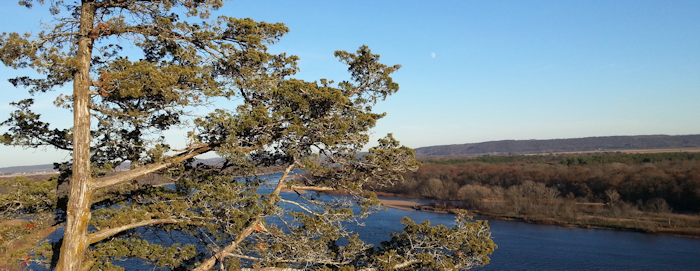Lessons of the Lower Wisconsin River
Beautifully conserved, it's the longest free flowing river left in the Midwest.
A 25th anniversary is silver and a 50th is gold, but there is no precious metal associated with a 30th anniversary. Nonetheless, a recent celebration of the 30th anniversary of the Lower Wisconsin Riverway was a sterling event.
The Lower Wisconsin Riverway was created by a state law in 1989, to protect the 92 miles of river from the last dam at Prairie du Sac to its confluence with the Mississippi. It is the longest free flowing river left in the Midwest.
The Riverway law was a pioneering effort to protect the river and nearby lands while involving local citizens in its management. And 30 years later, despite considerable initial skepticism, that pioneering effort has more than stood the test of time.
We in Wisconsin are blessed with a wonderful natural heritage — great forests, a wealth of water resources, a varied landscape, an abundance of wildlife, tremendous outdoor recreational opportunity and knock-your-socks-off scenery. Perhaps nowhere is the natural heritage of our state better epitomized in scale and richness than the 80,000 acres of the Lower Wisconsin Riverway. The course of the river is graced by towering sandstone bluffs, native prairies, lowland forests and sandy beaches and soaring bald eagles. It provides habitat for 61 endangered and threatened species, and 100 species of birds. The Riverway protects 20 state natural areas which are special areas chosen because they are outstanding examples of Wisconsin’s native landscape of natural communities and significant geological formations. In the Lower Wisconsin Riverway, these areas include dry mesic prairie, old growth lowland forests, sedge meadows, sand barrens and hard wood bluffs.
At the celebration in Sauk City last Sunday, I was joined by Republican former state Sen. Dale Schultz and Republican former Gov. Tommy Thompson. Dale Schultz, who was then a member of the Assembly, played a key role in the eventual legislation which Thompson signed into law.
While the event was very congenial, the path to the Riverway law was not so smooth. The legislation I introduced to protect the river was controversial. At many hearings and public meetings, emotions ran hot and heavy. However, Dale, Tommy and I, along with many others were willing to listen each other’s concerns, work together and come up with a solution that has worked — and worked well— and gathered strong public support. The success of the Lower Wisconsin Riverway law should be a valuable lesson for today’s politicians. After all, no one is holding an anniversary celebration to mark a contentious debate, partisan rhetoric or a political power play.
As the Lower Wisconsin River flows majestically to the Mississippi past the vast natural areas and scenic bluffs that have been protected, it serves not only as a testament to the natural beauty and bounty of our state, but also as a living lesson to today’s officeholders that you will be remembered not for what you fought over, but for what you accomplished. The protection of this magnificent resource for future generations to enjoy and to be inspired by is an accomplishment well worth remembering and celebrating.
This column was originally published by the Cap Times in Madison.
Spencer Black represented the 77th Assembly District for 26 years and was chair of the Natural Resources Committee.
Op-Ed
-
Unlocking Milwaukee’s Potential Through Smart Zoning Reform
 Jul 5th, 2024 by Ariam Kesete
Jul 5th, 2024 by Ariam Kesete
-
We Energies’ Natural Gas Plans Are A Mistake
 Jun 28th, 2024 by John Imes
Jun 28th, 2024 by John Imes
-
Milwaukee Needs New Kind of School Board
 Jun 26th, 2024 by Jordan Morales
Jun 26th, 2024 by Jordan Morales





















